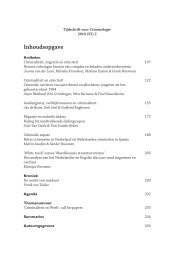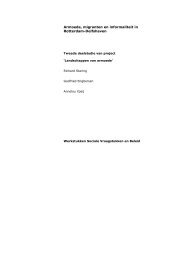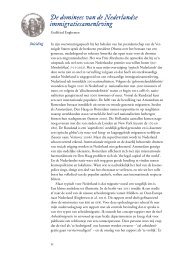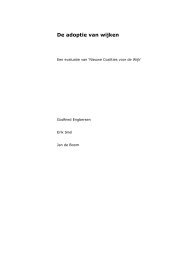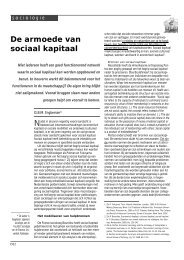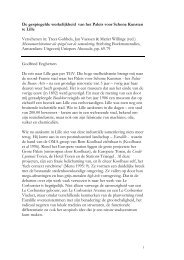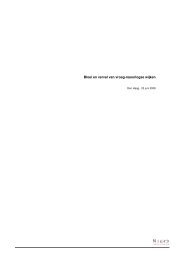THE SOCIAL CONSTRUCTION OF ILLEGALITY AND CRIMINALITY ...
THE SOCIAL CONSTRUCTION OF ILLEGALITY AND CRIMINALITY ...
THE SOCIAL CONSTRUCTION OF ILLEGALITY AND CRIMINALITY ...
Create successful ePaper yourself
Turn your PDF publications into a flip-book with our unique Google optimized e-Paper software.
16<br />
GODFRIED ENGBERSEN <strong>AND</strong> JOANNE VAN DER LEUN<br />
Dutch employers and have a tax and social security number (when they<br />
came to the Netherlands before 1991) or are left to their own devices. Whilst<br />
94% of the Turkish respondents look for work within their own community,<br />
this only applies to 67% of the Moroccans. Among the Moroccan<br />
respondents, about one fourth is involved in the drug trade. They come<br />
into contact with this type of informal or illicit work through other Moroccan<br />
migrants, but the interviews make clear that these ties are limited.<br />
These illegal immigrants are used as ‘messenger boys’ and do the risky<br />
part of the job in exchange for a ‘salary’. More encompassing forms of<br />
support are usually lacking. Not surprisingly, the illegal drug runners often<br />
fall back on organisations that support the homeless, rather than on<br />
their co-ethnics or family members. In sum, the illegal immigrants’ access<br />
to the labour market is increasingly dependent on immigrant networks<br />
and established immigrant communities.<br />
The Role of Implementation of Policies in Practice<br />
A third factor which influences the options for illegal immigrants is the<br />
policy towards illegal immigrants. The way in which these policy measures<br />
are implemented by, among others, the police, aliens departments, and<br />
officials of public and semi-public institutions is crucial in this respect.<br />
The interviews with professionals who have to implement the rules and<br />
regulations in practice, show that major policy priorities are not or insufficiently<br />
realised, and that lower level workers are often more lenient than<br />
the rules allow for. They use their discretionary autonomy to support people<br />
that they should officially exclude or they are not in the position to<br />
take effective measures. In other words: there is a certain social space, that<br />
some illegal immigrants can use to their advantage. The latter is particularly<br />
clear in the case of expulsions of illegal immigrants. Even when they<br />
are apprehended, many illegal immigrants who have committed crimes,<br />
are not expelled effectively and therefore can continue their activities.<br />
The above-mentioned does not mean that the restrictive policies have<br />
no effect whatsoever. Measures to close off the access to the formal labour<br />
market (such as the Identification Act, the linking of the social-fiscal<br />
number to a valid residence status etcetera) have had considerable impact<br />
and so have the attempts to exclude illegal immigrants from social services.<br />
But this is much less the case where the other policy priorities are<br />
concerned, such as the apprehension and expulsion of criminal illegal<br />
immigrants and the exclusion of illegal immigrants from provisions in the<br />
fields of education, housing and healthcare. These observations are not<br />
unique to the Dutch situation. A similar gap between policy goals and policy



